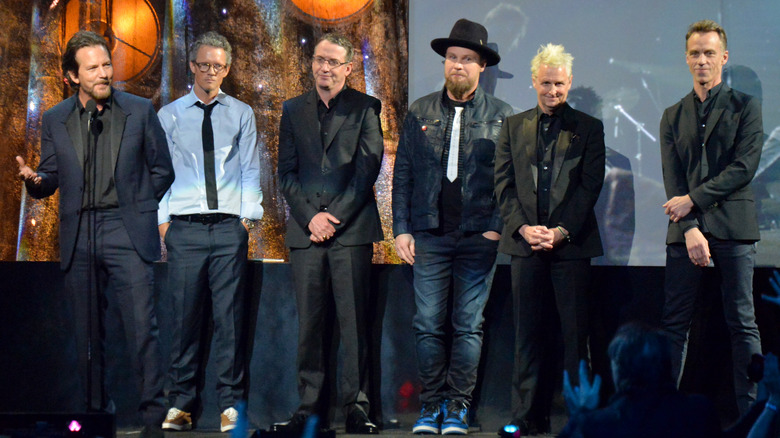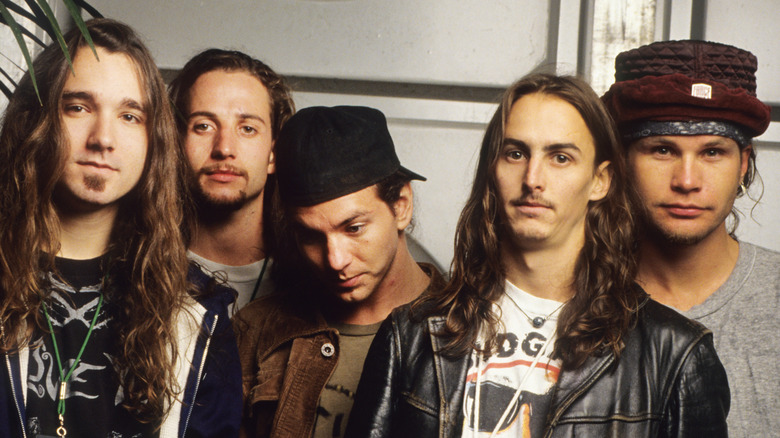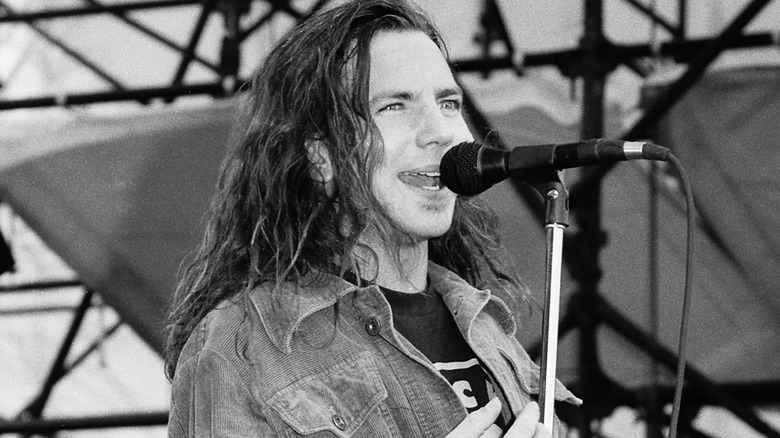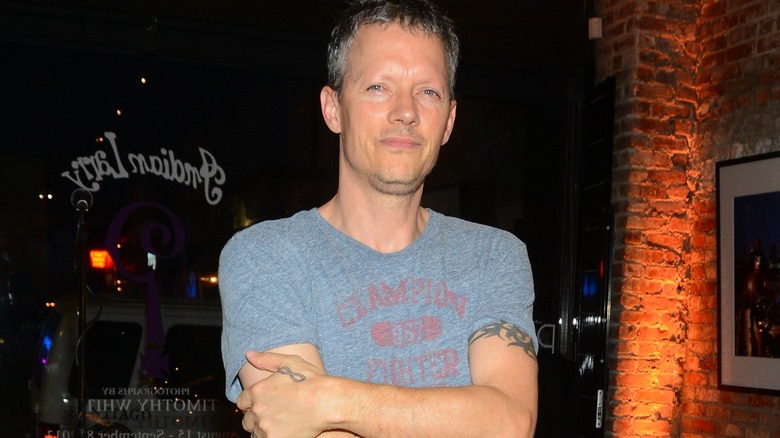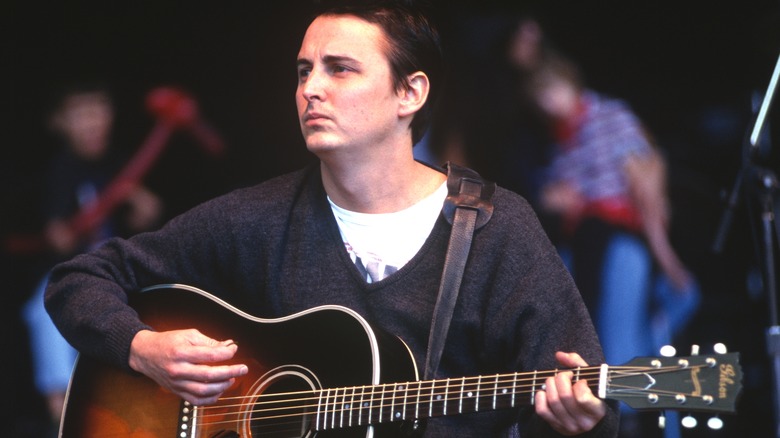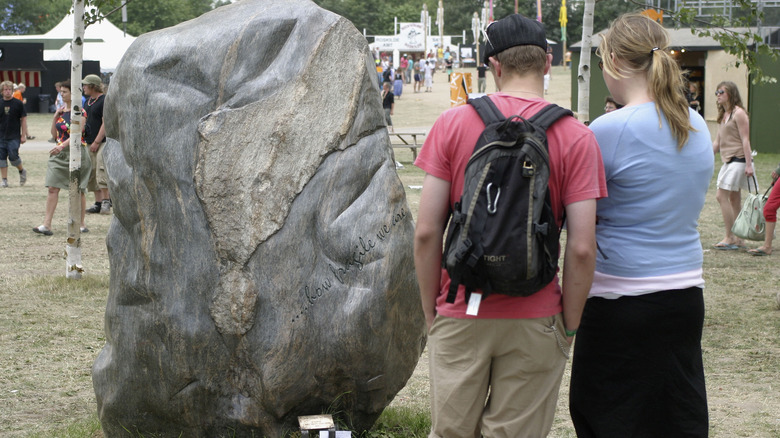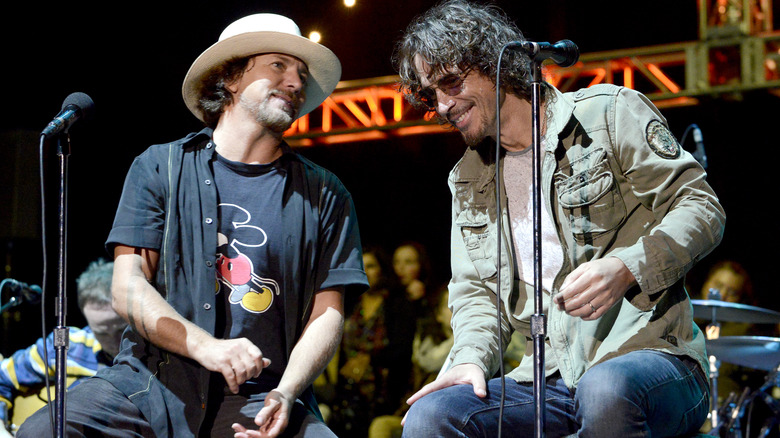The Tragic Real Life Story Of Pearl Jam
From their humble start as a band named after an NBA star to their present status as one of the few Seattle grunge acts of the early '90s that haven't stopped making music since their formation, Pearl Jam has seen it all. They've had numerous drummers come and go, feuded with Ticketmaster, and received flak for their sociopolitical stances, all while recording some of the most iconic rock songs of the 1990s and remaining far more than just a nostalgia act from years ago. And aside from that thing with the revolving-door cast of drummers that marked their first decade as a band, it's no joke to maintain the same lineup for more than two decades.
Amid all that success and adulation, Pearl Jam and its members have experienced a number of sad events in their lives. These include, but are not limited to deaths of close friends, family members, and fellow musicians; substance abuse issues; and one particular tragedy that nearly broke up the band. As inspiring as Pearl Jam's history may be in the grand scheme of things, these are the events that make up the tragic part of their ongoing story.
A tragic death served as the band's catalyst to form
When Pearl Jam's founding fathers got together to form the group, bassist Jeff Ament and guitarist Stone Gossard were veterans of the Seattle scene, having played for seminal proto-grunge rockers Green River and later for Mother Love Bone, a glam-infused hard rock act fronted by Andrew Wood. Following Wood's fatal heroin overdose in 1990, Ament and Gossard dealt with their grief in different ways: Ament pursued a graphic arts career while still playing music on a smaller scale, while Gossard pushed forward with his musical ambitions, this time opting for heavier songs than the ones he helped create with Mother Love Bone.
Meanwhile, Gossard's friend Mike McCready was upset over the recent disbandment of his own group, Shadow, and Gossard invited him to join his yet-unnamed project, hoping this opportunity would help him break out of his funk. The two guitarists clicked perfectly during a series of informal jams, and when Ament joined the duo, the seeds were planted for what would turn out to be one of the most influential bands of the 1990s rock scene.
If you or anyone you know needs help with addiction issues, help is available. Visit the Substance Abuse and Mental Health Services Administration website or contact SAMHSA's National Helpline at 1-800-662-HELP (4357).
Eddie Vedder only learned the truth of his parentage as a teen
Soon after the band's early rehearsals, Jeff Ament, Stone Gossard, and Mike McCready brought in two new members to complete the lineup: drummer Dave Krusen and singer Eddie Vedder, who was then establishing himself as an up-and-coming musician in San Diego. Of course, we now know that Vedder would essentially define Pearl Jam's sound as their lead singer and primary songwriter, and one of the earliest signs his Seattle-based bandmates knew they were working with someone special was when he provided lyrics to Gossard's "Dollar Short" demo and transformed it into the song now known as "Alive."
The lyrics stand out because they tell a fictionalized account of an unforgettable moment in Vedder's life. For much of his youth, he believed that his mother's husband, Peter Mueller, was his birth father, only to find out in his teens that Mueller was actually his stepfather. Vedder's birth father was a man named Ed Severson, whom he had mainly known as a family friend and had since died of multiple sclerosis.
Speaking to Howard Stern on his eponymous show in 2020, Vedder said that while this revelation shocked him, he was somehow relieved to learn the truth, given his contentious relationship with his stepfather. "When my mom told me that this guy wasn't my father and it was somebody else — you know, it was a shock, but I was so grateful in a way," the singer said.
Pearl Jam's first drummer quit because of his alcoholism
Before they hired Soundgarden's Matt Cameron in 1998, Pearl Jam went through a series of drummers who each left after no more than two albums with the band. Dave Krusen was the first of those drummers, having played on Pearl Jam's 1991 debut album "Ten," but he left soon after the making of the album. Speaking years later to Rolling Stone ahead of Pearl Jam's 2017 Rock and Roll Hall of Fame induction, Krusen opened up about why he really left the group. "I'm an alcoholic," he admitted. "I had really been just sick of my disease at that point and could just not stop drinking."
Krusen, who left right before Pearl Jam broke out as a force to be reckoned with in the Seattle grunge scene, told Rolling Stone that missing out on this success was not that hard for him. "I had to either accept or let it run me over," he said. "I had to accept it and move on with my life. I realized, also, that's music and that's what I wanted to do. The upside of it was it got me to take notice of my life and get my s*** together."
Following his stint with Pearl Jam, Krusen spent time with a few other familiar names in rock, including Candlebox and Unified Theory.
If you or anyone you know needs help with addiction issues, help is available. Visit the Substance Abuse and Mental Health Services Administration website or contact SAMHSA's National Helpline at 1-800-662-HELP (4357).
One of their videos was blamed for a school shooting
"Jeremy" is a standout track from the "Ten" album, yet it is also arguably the record's most controversial song, having been inspired by a real-life incident where Richardson, Texas, high school sophomore Jeremy Wade Delle died by suicide in front of his classmates and teacher. Six years after Delle's death in January 1991 and five years after "Jeremy" was released as a single, the song's video — which told the story of a troubled young boy who was bullied in school and ignored at home — drew attention when it was blamed for a school shooting in Pearl Jam's home state.
On February 2, 1996, 14-year-old Barry Loukaitis, a student at Frontier Junior High School in Moses Lake, Washington, shot and killed two students and a teacher and seriously injured another student, allegedly in part because he was disturbed by Pearl Jam's video for "Jeremy." As reported by the Seattle Times in 1997 (via MTV), Loukaitis' mother, JoAnn Phillips, claimed in court that her son memorized the song's lyrics and was "real fidgety and uncomfortable" while watching its video.
Commenting about the "Jeremy" video and how it was already garnering controversy at that time, Eddie Vedder told Rockline (via Five Horizons) in 1993 that he didn't believe violence or suicide was the answer for bullied kids such as the video's subject. "The best revenge is to live on and prove yourself," he said. "Be stronger than those people. And then you can come back."
If you or anyone you know is having suicidal thoughts, please call the National Suicide Prevention Lifeline by dialing 988 or by calling 1-800-273-TALK (8255).
Mike McCready struggled with his personal demons
Dave Krusen was not the only Pearl Jam member who faced substance abuse issues in the 1990s. Guitarist Mike McCready was in a similar situation following the success of "Ten" and Pearl Jam's 1993 follow-up album, "Vs.," turning to drugs and alcohol as he struggled to cope with the band's increasing popularity and critical acclaim. He eventually checked into Hazelden Rehabilitation in Minnesota, where he met bassist John Baker Saunders. Together with Saunders, Screaming Trees drummer Barrett Martin, and Alice in Chains frontman Layne Staley, the now-sober McCready formed the supergroup Mad Season, which released one album, "Above," in 1995.
Though McCready credited Mad Season in a 2013 interview with PopMatters for helping him recover from his substance abuse issues, he wasn't able to record a follow-up album with the band. Saunders overdosed on heroin in 1999, and Staley was found dead in 2002 after years of drug addiction. "I thought Mad Season would be the antidote to my friend's health troubles," McCready told the outlet about Staley's death. "In hindsight, I realized everyone has to figure out their own issues by themselves."
If you or anyone you know needs help with addiction issues, help is available. Visit the Substance Abuse and Mental Health Services Administration website or contact SAMHSA's National Helpline at 1-800-662-HELP (4357).
Pearl Jam nearly disbanded after the Roskilde tragedy
On June 30, 2000, one of the worst tragedies in the history of live rock concerts happened at the Roskilde Festival in Denmark, as eight people died of suffocation in the mosh pit during Pearl Jam's set, with a ninth attendee dying five days later.
In a 2003 interview with Rolling Stone, Eddie Vedder admitted that the deaths at Roskilde impacted his band so much that they were strongly considering calling it a career. "We came together as close as we could," the frontman said. "People handled it in different ways. The guys whose general disposition is more emotional — they became more composed. Whereas some of the people who are more conservative with their emotions — they kind of cracked." Vedder also revealed that Stone Gossard was most affected by the tragedy, to the point he was ready to quit after Roskilde. "And I thought that if anyone ever lost their lives at one of our shows, that would be it. I would never play again," he continued.
Despite how close they apparently came to disbanding, Pearl Jam was back onstage in the U.S. about a month later, and Vedder credited Sonic Youth's presence as their opening act as a huge morale boost. In particular, he thanked Sonic Youth co-founders Thurston Moore and Kim Gordon's young daughter Coco for boosting his spirits on tour. "When she's in her twenties, I'll tell her how much that meant to me," the singer said.
Vedder dealt with personal loss in the mid-2010s
The years 2016 and 2017 were rough ones personally for Eddie Vedder. In 2016, his half-brother Chris Mueller died in a climbing accident; years later, he would dedicate the song "Brother the Cloud" from his 2022 solo album "Earthling" to his brother's memory. He also opened up to Howard Stern in 2020 about how the loss affected him and his family. "That one took me down so hard ... I seriously didn't know if I was going to get out of that one and it really hurt me to think of what my daughters were witnessing," he said. "But there was no hiding it, and it was a dark place."
One year after Chris Mueller's death, Vedder's longtime friend, Soundgarden frontman Chris Cornell, died by suicide, and this loss also had a tremendous impact on the Pearl Jam singer. The two had first worked together when Vedder and Cornell dueted on lead vocals on "Hunger Strike," a song from Temple of the Dog's self-titled tribute album to Mother Love Bone's Andrew Wood.
In the Stern interview, Vedder reflected on his friendship with Cornell, and how they only saw each other a few times in the last decade or so of Cornell's life. "I still haven't quite dealt with it," Vedder told Stern, referring to Cornell's death. "I'll get stronger as time goes, but ... we were close, and it wasn't just because we were playing music."
If you or anyone you know is having suicidal thoughts, please call the National Suicide Prevention Lifeline by dialing 988 or by calling 1-800-273-TALK (8255).
